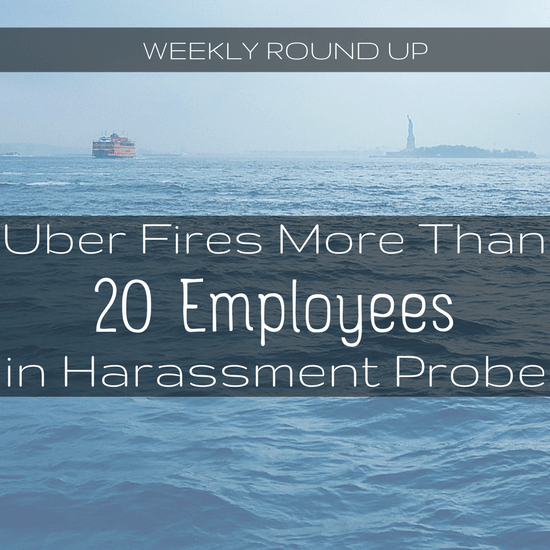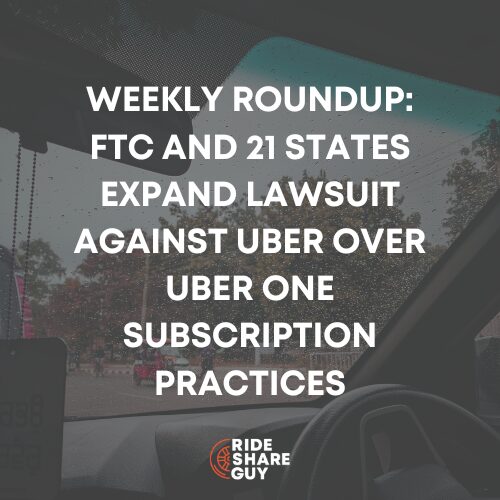Harry here. I feel like I’ve been saying the same thing every week: it’s been a busy week for Uber. This past week was no different, with one of the most surprising updates being Uber firing 20 employees. Can this continue, or does Travis need to go? Senior RSG contributor John Ince updates us on the latest in the rideshare industry below.
Uber Fires More Than 20 Employees in Harassment Probe [Bloomberg]
Sum and Substance: Employees are awaiting final results from two separate probes. Uber fired more than 20 people after a company-wide investigation into harassment claims and hired at least two high-profile senior executives whose job will be to set strategy and rethink branding. Law firm Perkins Coie LLP led the investigation, reviewing 215 human-resources claims; while it took no action in 100 instances, it’s still probing 57 others.
There’s also a separate investigation commissioned by Uber that’s being led by former U.S. Attorney General Eric Holder. That group shared detailed findings with a subcommittee of Uber’s board of directors, but a summary isn’t expected to be made public until next week, a person familiar with the matter said. Uber also plans to take action on some of the report’s findings next week, the person said.
“They’re showing that they’re going to take some concrete steps to address the matter,” said Evan Rawley, a professor at Columbia University’s business school. “This issue is going to keep being at the forefront until the investigation is completed.” Uber is awash in investigations after former engineering employee Susan Fowler published a blog post alleging that she was sexually harassed and that the case was mishandled by human resources and senior management.
Uber’s woes don’t end there. It’s also suffered a flurry of departures by senior executives, including heads of finance, growth, engineering and policy and communications. Chief Executive Officer Travis Kalanick — who himself has made a series of public relations blunders, including being caught on video arguing with an Uber driver — has conceded he needs leadership help and hired a search firm to find a chief operating officer.
Bobbie Wilson, an attorney at Perkins Coie, gave Uber’s more than 12,000 employees an assessment of the firm’s investigation on Tuesday, according to a person familiar with the issue. Some of the people fired were senior executives, according to the person, who asked not to be identified discussing personnel matters. The company didn’t name the employees who were let go.
Aside from those fired, 31 employees are in counseling or training, while seven received written warnings from the company, an Uber spokesman said. The issues deal with harassment, discrimination, retaliation and other HR matters.
Kalanick has taken other steps to clean up Uber’s image. He asked for the resignation of Amit Singhal, his new head of software engineering, after the company learned of a sexual harassment claim at his former employer, Google. Singhal, who left in late February, denied the allegation.
In the wake of complaints and the leadership void, Uber hired two women as senior executives — former Apple Inc. executive Bozoma Saint John as chief brand officer and Harvard Business School Professor Frances Frei as senior vice present for leadership and strategy…. Frei is the author of the book “Uncommon Service: How to Win By Putting Customers at the Core of Your Business,” and plans to commute from Cambridge, Massachusetts, to San Francisco.
My Take: The firing has begun in earnest at Uber. Meanwhile the company shells out more big bucks for two highly paid consultants whose job it is to “rebrand” the company and “coach” the company’s leaders. I can’t see how any of these changes in Uber corporate are really going to make much of a difference to those of us out on the road.
The change I’d like to see is when CEO Travis Kalanick again starts using the service he created, so he can have some real conversations with real drivers about the experience. Unfortunately for TK, last time that happened, it was videotaped and went viral. What was TK’s response then? He immediately hired a personal driver and stopped taking Uber – so he wouldn’t have to interact with drivers. All this other stuff going on somehow seems like window dressing, unless TK recognizes how vital drivers are to the success of the company.
For Uber To Change, Kalanick Must Go [Inc.com]
Sum and Substance: Uber’s personnel scandals and business strategy simply reflect the personality and morals of its founder. Uber’s corporate culture is toxic, rife with sexual harassment, drug abuse, and bullying so severe that one manager “threatened to beat an underperforming employee’s head in with a baseball bat,” according to the New York Times. In response to months of bad publicity about its personnel practices, Uber has now hired Frances Frei, a Harvard Business School professor, to help them fix their obviously broken culture.
I’ll get to professor Frei in a second, but first I have an observation: Uber’s personnel scandals are simply the internal manifestation of a culture that manifests itself externally in the form of highly questionable business practices. These practices allegedly include:
Using a secret tool to avoid authorities in cities where Uber is restricted.
Having male managers pretend to be female to get drivers to work more.
Stealing intellectual property (according to a Google lawsuit).
Breaking its agreement with Apple by digitally fingerprinting iPhone users.
Insufficiently vetting drivers thus putting female riders at risk.
Underpaying drivers and misleading them (according to drivers)
And now just this week, something truly disgusting and disturbing:Raising prices during the recent London Bridge terror attack.
… unethical bosses inevitably surround themselves with unethical employees. At Uber, success results from breaking rules and exploiting people. Any company that pursues that business strategy will be filled with managers who break rules and exploit people. Same culture, different symptoms.
Which brings us to Frances Frei, recently of the Harvard Business School and now SVP of Leadership & Strategy, reporting to Uber CEO Travis Kalanick. According to the Uber blog post announcing the hire, Frei “will act as a partner to our Chief Human Resources Officer Liane Hornsey, and to the executive leadership team at large, in some critical areas including: company strategy and planning; organizational transformation and design; management and leadership; coaching, supporting and developing a world-class leadership team; and articulating and helping to architect and adapt our cultural philosophy.” Yeah, right. … The idea that some random academic without any staff or actual organization power–other than “act as a partner” (whatever that means)–could change ANY corporate culture–let alone one as entrenched and toxic as Uber’s–is beyond ludicrous.
My Take: A few weeks ago, Uber CEO Travis Kalanick lost his mother in a tragic boating accident. His father was also in critically injured. Combine that with what he’s going through at Uber now, and you have to believe he’s being tested in a way he has never been tested before.
According to two early investors in Uber who know Travis well, he’s in a very vulnerable state right now. But tragic news aside, let’s put this in some perspective: Travis Kalanick is still living the good life. He’s a celebrity. He’s a Silicon Valley dreamer and schemer who has stumbled upon the startup of the decade. Between Travis’ and Garrett Camp’s voting rights, they have sufficient shares to prevent the board from forcing a shakeup. In other words, the trials of Travis are all a matter under his control. He could walk away from Uber and still be worth about $6 billion… on paper.
Embattled Uber CEO Travis Kalanick has started meditating in an office lactation room, says Arianna Huffington [CNBC.com]
Sum and Substance: Amid a litany of accusations about Uber’s “bro culture,” board member Arianna Huffington has been trying to help turn things around, and she’s starting at the top — with CEO Travis Kalanick. So far, her guidance appears to be having an effect: He’s started meditating.
Without corporate meditation rooms (yet), Kalanick dipped into an available lactation room to get a few minutes of peace and quiet, she says. “Literally, it was an amazing moment last week when we were in the office and he said, ‘I really need to go meditate in order to be in a place to make good decisions right now,'” says Huffington, speaking at the iCONIC conference in New York City on Wednesday.
“And literally [he] went into a lactation room that happened to be open, because they don’t have meditation rooms yet. This is part of the change coming.” The meditation helps Kalanick, Huffington says. “Literally, Travis returned and you could see the change in the way he was and the way he could process making decisions.” She told CNBC earlier Wednesday that there will be “restructuring of the management team” at Uber. . “If you are feeling that you are running on empty, if you are feeling that you are not as productive, why shouldn’t your boss want you to go take a 20-minute meditation break or nap break and return recharged? … This would be another productivity enhancement.”
My Take: One of the fascinating subplots in the Uber mini-drama is the role of recently appointed board member, Arianna Huffington. Huffington is best known for, among other things, starting and running the liberal blog, Huffington Post, which she sold to AOL, pocketing millions.
Now Huffington re-appears under the guise of a close friend and advisor to Uber CEO, Travis Kalanick – who she tells us is now meditating inside a lactation room. [Editor’s note: Really? He takes up a room that lactating/new mothers use? There are no other private rooms available?] She also tells us it has worked wonders on Travis.
All the while, Arianna is also hawking her latest startup – Thrive – which is all about getting overworked executives to sleep more and live a more healthy lifestyle. Can you imagine a better setup? The whole charade would be amusing if it wasn’t so self serving.
Playing Catch-Up to Uber on Self-Driving, Lyft Teams Up With Partners [The New York Times]
Sum and Substance: Uber is spending millions of dollars to make self-driving cars on its ride-hailing network a reality. Now Lyft, one of Uber’s biggest competitors, is striking a series of partnerships to do the same. Lyft on Tuesday announced an agreement with nuTonomy, a self-driving car start-up, to eventually bring thousands of nuTonomy’s autonomous vehicles to Lyft’s ride-hailing network.
The partnership will initially focus on research and development related to the customer experience of summoning an autonomous vehicle, Lyft said. It is part of a larger outreach to the autonomous vehicle industry to join what Lyft calls its “Open Platform Initiative” to work with the ride-hailing company…. The agreement is part of Lyft’s broader move into autonomous car-sharing. Mr. Green has long postulated that the future of transportation will be less focused on private car ownership. …
Lyft’s approach to self-driving vehicles is different from Uber’s. It does not have teams of engineers developing technology for autonomous driving. Mr. Green described how Lyft instead plans to be involved in multiple partnerships, whether with self-driving software developers like nuTonomy, or with automakers like General Motors, a major Lyft investor. Last month, Lyft confirmed it will partner with Waymo on self-driving products. Both companies have yet to disclose the details of the arrangement or what kind of collaboration is to be expected.
“We see ourselves as a kind of Switzerland,” Mr. Green said. “We don’t think there will be a single player that will win the whole autonomous vehicle game.” Founded in 2013, nuTonomy was spun out of the Massachusetts Institute of Technology and, last year, raised $16 million in venture capital. NuTonomy has been testing its self-driving software with riders on public roads in Singapore for about a year, and it will begin its pilot program with Lyft in the Boston area, where nuTonomy’s headquarters are, in the coming months.
My Take: Amid all the bad press following Uber around, Lyft has quietly been going about its business – adopting a strategy of developing partnerships as opposed to trying to be the top dog in driverless cars. Logan Green’s analogy of Lyft playing the role of Switzerland is a good one. From all appearances, Uber has been wasting tons of money in this area – paying over $600 million to acqui-hire Otto’s CEO Anthony Levandowski, then firing him when Google / Alphabet / Waymo sued. Somehow Lyft seems to be gaining ground on Uber – more because Uber is moving backwards, while Lyft is slowly but surely moving ahead.






